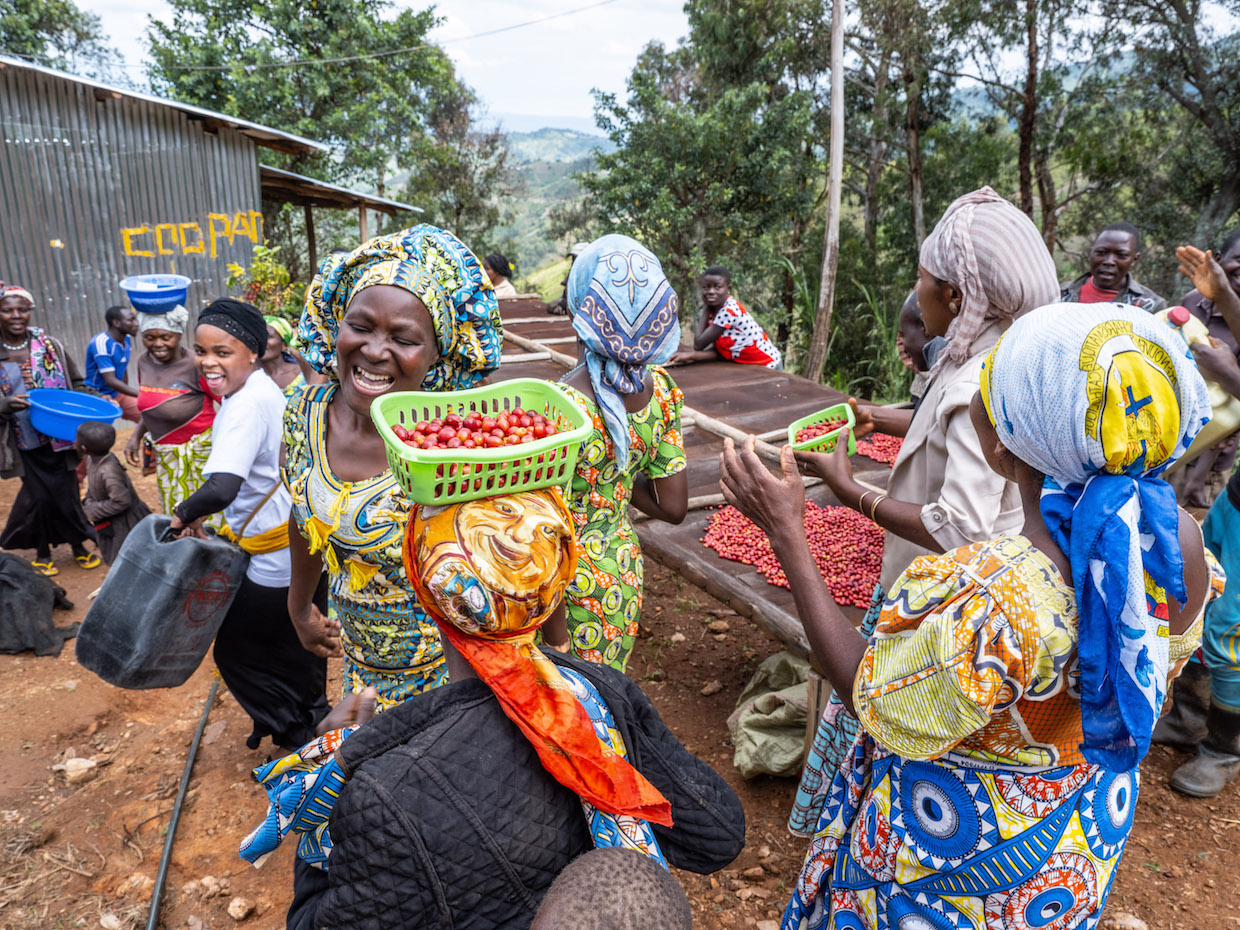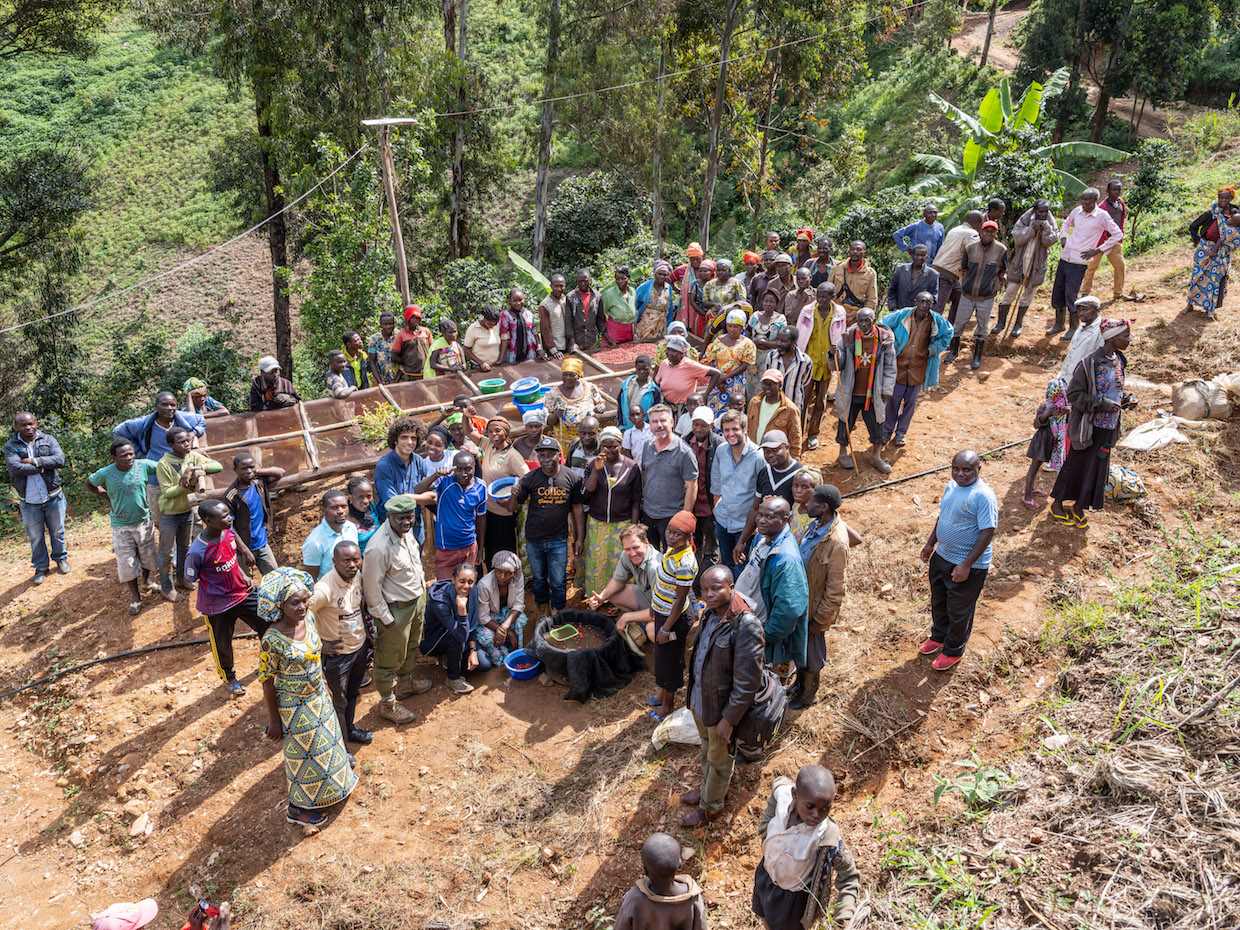
The Rwenzori Mountains from Virunga National Park’s northern base at Mutsora. Courtesy photo by Carl de Keyzer / Magnum Photos for the Virunga Foundation.
On top of the typical challenges facing coffee growers, farmers in North Kivu in the Eastern Democratic Republic of Congo this harvest season have seen attacks by armed groups, flooding and mudslides, the Ebola epidemic and now the COVID-19 pandemic.
A year ago, Daily Coffee News reported on the extraordinary potential of Eastern DRC as a producer of specialty coffee, and on the people who are working to make it happen.
Since then, coffee producers in this region have been dealt this array of external threats, yet they remain undaunted and unbowed in their pursuit to produce coffee that can help promote livelihoods and protect the endangered lands and wildlife — including the last remaining wild mountain gorillas — in this area.
My focus for this piece is on the cooperatives Coopade and Kawa Kanzururu, which have been working in partnership on a coffee development project with Virunga National Park
and Farm Africa, along with numerous trading partners and Root Capital, which has provided prefinance facilities.
These organizations are hoping to prove just how much can be overcome and achieved through a close collaboration to build a strong value chain.
Extreme weather
On May 22, a mudslide caused by the violent storms that have ravaged large parts of the African Great Rift Valley destroyed the coffee washing station in the village of Ngingi on the western slopes of the Rwenzori mountains in Eastern DRC, carrying away the parchment coffee that was on the drying tables as well as destroying farmers’ crops.
The same storms caused floods that washed away the bridge on the dirt road to Kasindi in Uganda, which was the principle export route in the 1,050-mile (1,689-kilometer) journey to the port of Mombasa in Kenya.
The subsequent rerouting to another road farther north have added to the periodic closures of the border and quarantining of drivers due to the COVID-19 pandemic, and an accompanying shortage of both shipping containers and trucks.
Were it not for Grainpro bags, this would be threatening the quality of the coffees, which score from mid to high 80s on the SCA scale.
Attacks by armed groups
With no prior warning, on the night of May 31, armed men attacked another nearby village, leaving six people dead, a further four abducted and a population terrorized. Since then, attacks have been ongoing. To date, more than 40 people have been killed and several more abducted.
Many of Kawa Kanzururu’s members have started to flee their farms. Yet the co-operative remains active, bringing down their fly crop coffee and transporting it to the mill in Beni in northeastern Congo.
The cooperatives were all too familiar with the ravaging caused by the armed groups, which have plagued the area for more than 20 years, creating terror and confusion with the aim of controlling the region’s rich resources.
In the 2018-19 harvest, two of the managers of Coopade’s washing stations were killed. More than 175 Virunga National Park rangers have been killed in the course of their work to protect the mountain gorillas and other wildlife. The latest atrocity was earlier this spring when 13 rangers were killed. The National Park is currently reinforcing their northern base at Mutsora where the agricultural team is based.
Through all this, the farmers in Coopade and Kawa Kanzururu have maintained their strong sense of mission and determination to harness the amazing coffee they grow to bring peace, stability and prosperity to their communities.
The first priority: top quality
With the rich volcanic soils, ideal climatic conditions and altitudes reaching more than 2,000 meters, the coffees produced in this region have been able to reach high cupping scores when processed using updated techniques.
Because of this demonstrated potential, the Virunga National Park/Farm Africa project’s first priority over the last year has been to support the cooperatives to reinforce the infrastructure at the micro washing stations, refurbishing pulpers, bringing in new washing tanks and greatly expanding the drying tables.
Women in charge
It is well known that Eastern Congo is a very tough place for women. Addressing that in practical ways is essential for transformation to take place. Coopade and Kawa Kanzururu are doing this by establishing and promoting Womens’ Sections who run several of the washing stations.
In a pilot project this year, the coffee delivered by women members to Coopade’s Kirindera washing station was processed and exported separately, and has achieved some of the highest cupping scores of all. The women decided to call their coffee “Kirindera Women’s Peace Coffee” and explained the reasons for choosing this name.

Kirindera Coffee Washing Station. Courtesy photo by Carl de Keyzer / Magnum Photos for the Virunga Foundation.
“It’s because of the atrocities that have been committed and which continue to be committed in Eastern Congo,” the women stated. “It’s so that by growing coffee women can say no to what is happening — and, in particular, by employing young people we can provide them with an alternative so that they are no longer drawn to join the armed groups that are destabilizing Virunga National Park. We want to see peace for everyone living in DR Congo, and above all for those living on the borders of the Virunga National Park”.
The next stage: holistic and sustainable farming
For decades, the only market for coffees grown here was to middlemen for low prices before the coffee was smuggled over the border to Uganda. Thus, there was no incentive for long-term quality improvements.
Now that new markets have been created, farmers want to improve productivity for the long term, while also producing food and other crops to ensure a year-long income.
This year, the Virunga National Park project with Farm Africa will begin training on good agricultural practices. The project will also promote nurseries to make available improved bourbon coffee varieties, as well as trees to provide shade, nitrogen fixing, timber and food within the Rainforest Alliance and Organic certified farming systems.
Key role of marketing partners
The Virunga National Park/Farm Africa project’s strategic marketing partners Volcafé Select and Malongo with Rombouts have demonstrated extraordinary commitments based on long-term agreements.
Dirk Sickmueller, Head of Volcafé Select, visited in late 2019, and Jean-Christophe Galland, buyer for Malongo, was also due to visit prior to the COVID-19 pandemic. They have bought all the coffee produced by the cooperatives, rewarding quality and certifications, and have worked tirelessly with local freight forwarders to get the coffee down to the port of Mombasa.

The Virunga National Park and Farm Africa team at Coopade with Dirk Sickmueller. Courtesy photo by Carl de Keyzer / Magnum Photos for the Virunga Foundation.
In this way, the resilience and determination of everyone involved has been rewarded. The story is far from over, but happily the coffees from the 2019-20 harvest have now all safely left eastern Congo, and the first have just started to arrive in Europe and will soon also land in the United States.
Editor’s note: Any views or opinions expressed in this piece are those of the author and are not necessarily shared by Daily Coffee News.
Richard Hide
Richard Hide has spent the last 28 years working with smallholder coffee farmer cooperatives to develop and market exciting, high-quality coffees. Hide is currently serving as the marketing representative of the Virunga National Park/Farm Africa project.
Comment
2 Comments
Comments are closed.











Los caficultores ; en todo el mundo; vienen siendo manipulados por intereses cruzados de los intermediarios. Definitivamente el cultivo del café es un cultivo de pobres manipulados.!!
Although there is clearly lots of hard work to do, this is a wonderful story of persistence and overcoming adversity, and a great start! I hope that their success builds and that I can try some of their coffee with not only a rich taste, but a rich story behind it. And, I hope that these types of successes can be replicated around the globe in places that need it badly… where support to grow top-quality coffee can offer an alternative of hope and change the lives of a community for the better.